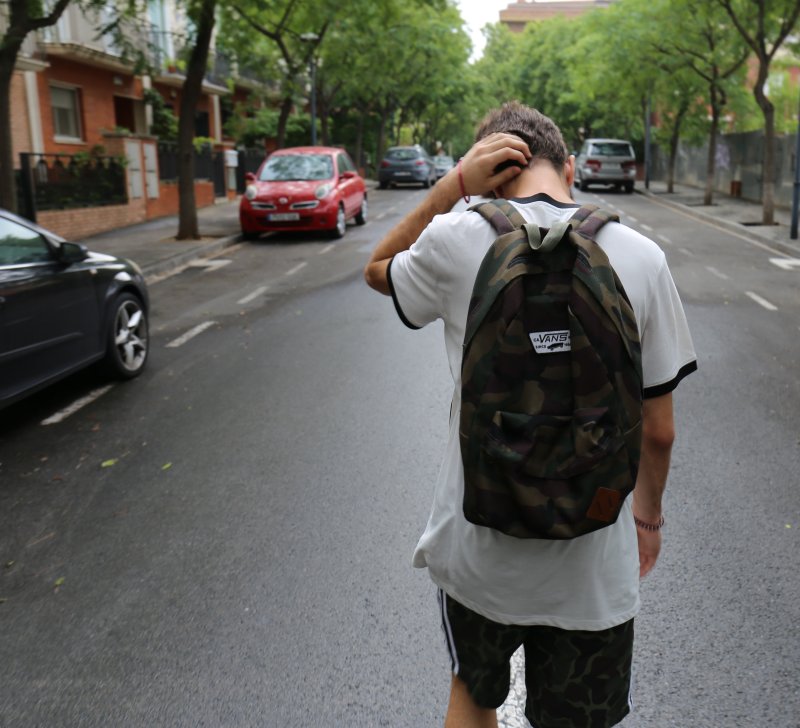
The pandemic has raised mental distress among many Americans, particularly service workers who have faced financial hardships. Photo by Jesús Rodríguez/Unsplash
Aug. 27 (UPI) -- COVID-19 has highlighted and worsened the mental health challenges faced by those struggling to make ends meet across the United States, experts said Thursday.
Nearly 70% of hourly workers in a "large U.S." city have lost income since the start of the pandemic, and that roughly 60% have lost their jobs, according to a survey conducted by researchers at Duke University and accepted for publication by the journal Pediatrics.
Concerns over financial well-being were among the reasons why up to one-third of all respondents reported "negative moods" some or all of the time since the start of the pandemic, the data showed.
"Back in 2019, we were already seeing there were regular changes to people's work schedules that happened at the last minute and were completely unanticipated -- [and] those work schedule changes have nearly doubled [during the pandemic]," co-author Anna Gassman-Pines said on a call with reporters.
"When you don't know when you're going to be working or for how long, that's creating a tremendous amount of additional stress for these families [because] for hourly workers, if they don't work, they don't have earnings," said Gassman-Pines, an associate professor of public policy psychology at Duke University.
Concerns over the spread of COVID-19 and its impact on American society compounded the stress, researchers at Johns Hopkins University said during another call with reporters Thursday.
For a study published in July by the American Journal of Preventive Medicine, researchers surveyed more than 6,300 adults across the United States between March 10 and 31 -- the early stages of the outbreak in most regions of the country.
Over that three-week period, time spent on social media increased by approximately 50%, from 50 minutes to 76 minutes per day. Survey participants also raised their consumption of "traditional media" print, online and TV news -- by about 33% -- from an average of roughly 2.3 sources to three sources per day, the data showed.
This rise in media consumption was associated with "increased mental distress," the researchers said.
Ongoing research being conducted by the same team has observed an increase in substance abuse generally among American adults since the start of the pandemic, according to Johannes Thrul, an assistant professor in the department of mental health at Johns Hopkins.
Another Johns Hopkins-led study, which will be published in October by the journal Preventive Medicine, found that 15% of nearly 10,000 U.S. adults surveyed in late March had symptoms of "psychological distress," with higher rates reported by those who saw the virus as a "threat" to their personal health and finances.
"This pandemic is impacting our lives in so many ways, socially, financially and in [mental] health," Elizabeth A. Stuart, Bloomberg Professor of American Health at Hopkins, said during the Thursday call.
WE NEED #WAGESFORHOUSEWORK
"This pandemic is impacting our lives in so many ways, socially, financially and in [mental] health," Elizabeth A. Stuart, Bloomberg Professor of American Health at Hopkins, said during the Thursday call.
WE NEED #WAGESFORHOUSEWORK
The Duke researchers surveyed 645 adults working in hourly service-industry positions in retail, food service or hotel industries in an unidentified U.S. city. Nearly half of the participants were Black Americans and 23% were Hispanic Americans, and 83% were women, the researchers said.
The mean annual household income among participants was less than $27,000, the researchers added.
In addition to the disruptions in employment -- and income -- caused by the pandemic, 45% said increased time spent caring for children home from school because closures related to containing the virus were impacting their ability to work and provide for their families, the data showed.
Although some of the "initial spikes" in mental health issues seen at the start of the pandemic have started to flatten, they still haven't returned to pre-COVID levels, said Stuart, of Johns Hopkins. The longer the crisis continues, the more likely it will have an impact on mental health, she said.
All of the researchers agreed some positives emerged, though. The pandemic has highlighted the need to recognize mental distress and address it, either through treatment or by engaging in "self-care," like proper sleep and increased exercise and physical activity, experts said.
In addition, the rise of telemedicine -- consultations with health professionals either by phone or online -- has increased access to mental health services for many people, particularly those in more rural areas, Stuart said.
Access to mental healthcare was an issue for many Americans, particularly the poor, prior to the pandemic, Duke's Gassman-Pines said.
"For low-income folks in the United States in particular, but for all of us, mental health treatment was already difficult to access before the pandemic," she said.
"Can we be thinking about transforming our mental health system [and] long term about really investing in supporting the mental health of the people in our communities?"
upi.com/7033890








